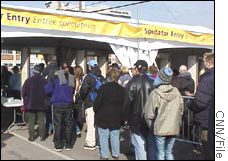
NEW YORK (CNN/Money) -
Patrick Brosnan recently brought his son, some fried chicken, and his handguns to two baseball games in New York.
Despite new security procedures in the wake of last year's terrorist attack, he says only the chicken garnered any attention from security personnel at the gates at Yankee and Shea stadiums.
"It's scary and it's really unconscionable," said Brosnan, a former New York City police detective who used to head Mayor Rudy Giuliani's security detail before retiring to start his own private security firm. "They need to ramp up level of professionalism. It just doesn't work otherwise. The potential downside is too significant."
Brosnan has a permit to carry the weapons he brought to the games in a fanny pack. He brought a .32-caliber handgun to a Yankee game. After getting this gun into Yankee Stadium, he decided to test the security at Shea by bringing in both a .32 and a .38 caliber gun to a Mets game. He had no problem.
 |
|
| The Olympics had tight security with all fans passing through metal detectors, but most sporting events save money by having far less effective screening. |
Brosnan said he's convinced that efforts to save costs are the only reason that stadiums don't have a high level of security. A simple measure such as hand-held metal detectors at each turnstile would have caught his weapons, he said.
"I think they're going to stay as cheap as they can get away with," he said.
The Yankees and Major League Baseball didn't return calls asking for comments on security procedures. The Mets defended their practices. A Mets official said the team has added a number of security measures in the past year, but he declined to discuss their cost.
"It's significantly higher cost," said Dave Howard, the Mets' senior vice president of business affairs. "The total [security] operation has been made more significant, and the higher cost goes along with that. We are confident that we are doing as good a job as we can with private security in combination with the New York Police Department and that we have a safe and secure facility."
Brosnan estimates the cost of hiring enough trained off-duty or retired law enforcement officers with hand-held metal detectors at each turnstile at Yankee or Shea stadiums would be less than $10,000 extra per game, a total of about $800,000 a season, or about 25-to-30 cents per fan.
The increased risk of terrorist attacks has driven up insurance costs significantly for stadium operators and teams, according to Lou Valentic, senior vice president of K & K Insurance, a leading underwriter of insurance for sports and entertainment venues. But insurance costs have not risen by enough to give the teams the immediate economic interest to beef up security along the lines advocated by Brosnan.
| |
 SportsBiz
SportsBiz
| |
| | |
| | |
|
Valentic said that liability insurance now costs 15-to-25 cents per attendee for the first $1 million of protection, with additional coverage a multiple of this base amount. He said these costs are 35-to-100 percent greater than a year ago. Property damage insurance has risen between 100 and 500 percent to between 5 and 10 cents per $100 of valuation, or $150,000-to-$300,000 for a $300 million stadium. But most stadiums and arenas are owned by local governments, not teams, and are self-insured for property damage.
Valentic said enhanced security doesn't automatically reduce insurance costs. He said that insurance companies are unlikely to require top-level security, like that seen at the Winter Olympics earlier this year in Salt Lake City, for every regular season sporting event.
"You're always going to be judged by somewhat of a reasonableness test," he said. "Unfortunately, the test doesn't occur until something happens."
The trade group for stadium and arena operators had a committee, which included top security officers from the various major sports leagues. It drafted a list of "best practices" for the types of measure that teams should implement. It called for greater security measures at games deemed to be "special events" or games that are nationally televised.
But Brosnan said he believes the same level of security must be used at all regular season games as at the World Series or Super Bowl, or else terrorists will target those events with weaker security measures.
| |
 Related stories
Related stories
| |
| | |
| | |
|
"Security should be consistent and constant and established," he said. "Where you have inconsistence and drop in security for economic reasons, that deterrence is lost."
So far, teams have not been hurt by security lapses. Fans, even Brosnan, are willing to accept the level of security provided in order to attend the games they want to see. I haven't stopped going to games myself despite writing on this topic. And a high-profile target like Brosnan's old boss, Rudy Giuliani, hasn't stopped attending games either.
"You couldn't keep him out. He's a rabid fan," Brosnan said.
A year ago when I wrote about security and the impact on fans' attendance and sports economics, I quoted a longtime New York Giants season ticket holder named John Stefanelli who had given up his tickets for the remainder of the 2001 football season due to security concerns.
This spring Stefanelli, who lost dozens of friends in the World Trade Center attack, again gave up his tickets for the 2002 season. But by the time opening night came last week, he had changed his mind and found tickets to attend the game.
"It just seemed like it's time," he said.
Here's hoping that time doesn't run out on the teams and sports leagues due to the gaps that remain in their security net. If it does, the pennies they're saving on security measures now could end up costing them millions of dollars and thousands of lives.

|

